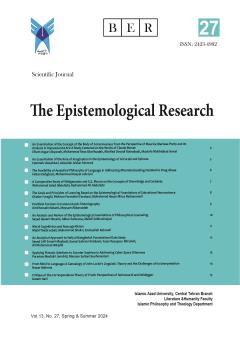Wittgenstein V G. E. Moore A comparative study between Wittgenstein and Moore about the two concepts of knowledge and certainty
Subject Areas : Epistemological researchesmohammad saied abdollahi 1 , Mohammad Ali Abdollahi 2
1 - qom university
2 - University of Tehran, College of Farabi
Keywords: Wittgenstein, Moore, knowledge, certainty, hinge propositions,
Abstract :
Today, although the debates related to knowledge have expanded, the question of the possibility of knowledge and certainty is still the starting point of epistemological debates. Wittgenstein and Moore are two influential philosophers of the 20th century who stand in an important position against each other. Moore is the only philosopher that Wittgenstein mentions in the book On Certainty and it was Moores view on knowledge that is the basis of the Austrian philosopher for further discussions about knowledge and certainty. In response to the problem of the possibility of knowledge and the problem of skepticism, Moore claims that there are facts that we know and have knowledge of. He lists a list of propositions whose knowledge is certain. Wittgensteins approach to this claim has a negative and a positive side. According to Wittgenstein, Moores propositions such as here is a hand are not correct examples of knowledge or knowing Moore does not use them correctly. There is a difference between knowledge and certainty. Knowledge and certainty belong to different categories. On the other hand, Wittgenstein is with Moore in attributing a different role to the mentioned propositions in the epistemic system. Wittgensteins criticism of Moore does not weaken the epistemological status of Moores propositions, but gives a more fundamental basis to such propositions.
گرایلینگ، ای.سی (1394). ویتگنشتاین. ترجمه ابوالفضل حقیری. تهران: نشر حکمت
گلاک، هانس یوهان (1389). فرهنگ اصطلاحات ویتگنشتاین. ترجمه همایون کاکاسلطانی. تهران: انتشارات گام نو
مور، جورج ادوارد ( 1382). برهان عالم خارج. ترجمه منوچهر بدیعی، ارغنون، شماره 7و 8 ، 123- 147
ویتگنشتاین، لودیگ (1387) در باب یقین. ترجمة مالک حسینی. تهران: انتشارات هرمس
Coliva, A and Moyal-Sharrock, D (2017). Hinge Epistemology, Brill Academic Pub
Coliva, A (2015). Extended Rationality: A Hinge Epistemology, Palgrave Macmillan
Moyal-Sharrock, D and William H. Brenner (2005). Readings of Wittgenstein’s On Certainty, Palgrave Macmillan
Moore, G, E (1925). A Defence of Common Sense, in J. H. Muirhead (ed.) Contemporary British Philosophy, Allen and Unwin, London: P. 193-223
Moore, G, E (1939). Proof of an External World, Proceedings of the British Academy, No:25, P. 273-300
Moore, G, E (1941). Certainty, in Philosophical Papers. P. 226-251. Reprinted in G. E. Moore: Selected Writings, P. 171-96
Morawetz, T (1978). Wittgenstein and Knowledge, The University of Massachusets
Moyal-Sharrock, D (2004). Understanding Wittgenstein’s On Certainty. New York: Palgrave Macmillan
Moyal-Sharrock, D (2016). The Third Wittgenstein The Post-Investigations Works, Routledge
Moyal-Sharrock, D (2021). Certainty in Action, Wittgenstein on Language, Mind and Epistemology, Bloomsbury Publishing Plc
Stroll, A (2013). Wittgenstein. One world Publications
Glock, Hans-Johann (1996). A Wittgenstein Dictionary, Wiley-Blackwell; 1st edition
Stiver, D (1997). The philosophy of Religios language, Oxford, London
Winch, P) 1995(. The Idea of a Social Science, 2nd edition, London: Routledge
Pritchard, D (2017) .Wittgenstein on Skepticism in :Blackwell Companion to Wittgenstein, (eds) H.-J. Glock & J. Hyman. Oxford, P. 563 -75
Wittgenstein, L (1998). Philosophical investigation, Blackwell


